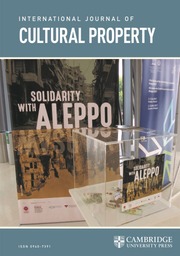Article contents
Protecting Taonga: the cultural heritage of the New Zealand Maori
Published online by Cambridge University Press: 18 February 2005
Extract
New Zealand concerns regarding cultural heritage focus almost exclusively on the indigenous Maori of that country. This article includes discussion of the way in which New Zealand regulates the local sale and export of Maori material cultural objects. It examines recent proposals to reform this system, including allowing Maori custom to determine ownership of newly found objects.
A major development in New Zealand law concerns the role of a quasi-judicial body, the Waitangi Tribunal. Many tribunal decisions have contained lengthy discussions of Maori taonga (cultural treasures) and of alleged past misconduct by former governments and their agents in relation to such objects and Maori cultural heritage in general.
As is the case with legal systems elsewhere, New Zealand seeks to reconcile the claims of its indigenous peoples with other priorities, such as economic development and environmental protection. Maori concerns have led to major changes in New Zealand heritage conservation law. A Maori Heritage Council now acts to ensure that places and sites of Maori interest will be protected. The council also plays a role in mediating conflicting interests of Maori and others, such as scientists, in relation to the scientific investigation of various sites.
Despite these developments, New Zealand has yet to sign the 1970 UNESCO Convention on the Means of Prohibiting and Preventing the Illicit Import, Export, and Transfer of Ownership of Cultural Property. The changes proposed to New Zealand cultural property law have yet to be implemented, and there is evidence of uncertainty about the extent to which protecting indigenous Maori rights can be reconciled with the development of a national cultural identity and the pursuit of universal concerns, such as sustainable development.
- Type
- Research Article
- Information
- Copyright
- © The International Cultural Property Society
- 11
- Cited by




